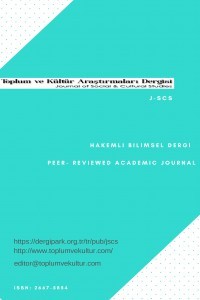PANDEMİK BAĞLAMINDA UKRAYNA HEI'lerinde E-ÖĞRENME KURUMSALLAŞMANIN ÖZELLİKLERİ: SOSYOLOJİK ARAŞTIRMA SONUÇLARI
Makale, koronavirüs salgını bağlamında Ukrayna Lisesinde e-öğrenme oluşumunun ve gelişiminin temel özelliklerinin değerlendirilmesine ayrılmıştır. Yazar, eğitim alanında Ukrayna'da geçerli olan yasal belgelerin (Ukrayna "Eğitim Yasası", Ukrayna "Yüksek Öğretim Yasası") çalışmasına dayanarak, eğitimin temel biçimlerini tanımladı. Uzak ve e-öğrenme olmak üzere iki kavramın tanımı ve farklılaşmasında terminolojik bir karışıklık olduğu bulundu. Bugün Ukrayna'da, eğitim sürecini organize etmenin geleneksel (sınıf) biçimlerinin bir kombinasyonunu ve eğitim faaliyetlerinin kademeli olarak sanal ortama aktarılmasını içeren karma bir eğitim biçiminin hakimiyetine yol açan eğitim modellerinin ve biçimlerinin bir melezlenmesi söz konusudur. e-öğrenme teknolojilerinin kullanımı yoluyla eğitim ortamı. Makale, Ukrayna'daki uzaktan eğitim teknolojilerinin durumu ve gelişimine adanmış sosyolojik araştırma sonuçlarını sunmaktadır. Araştırma, Ukrayna Eğitim ve Bilim Bakanlığı Genç Bilim İnsanları Konseyi ve STK "İnovasyon Üniversitesi" tarafından desteklenen Haziran 2020'den Nisan 2021'e kadar gerçekleştirildi. Araştırma sonuçlarının yorumlanması, e-öğrenmenin fırsatlarını, avantajlarını ve dezavantajlarını belirleme olanağına izin verdi. Anket sonuçlarının analizi, eğitim süreci katılımcılarının bilgi ve iletişim teknolojilerinin yaygınlaşması nedeniyle kendilerini aşan değişiklikleri farklı şekilde değerlendirdiklerini göstermiştir. Öğretim kadrosunun aksine eğitim başvuru sahiplerinin, eğitim sürecinde e-öğrenmeye aktif giriş fikrine ve teknolojilerine daha fazla destek sağladığı görülmüştür. Ancak çoğu, e-öğrenmenin yalnızca geleneksel eğitim modellerine bir ilave olacağına hala inanıyor. Böylece, e-öğrenme ve teknolojilerini geliştirme sürecinin uzun vadeli olduğu ve birçok sorunun çözülmesini gerektirdiği sonucuna varıldı, ancak Ukrayna Yüksek Öğretim Kurumları dijital bir eğitim altyapısı oluşturmak için aktif olarak çalışıyor ve dijitalleşme yönünde gelişmeye hazırlar. ve eğitimin uluslararasılaşması.
Anahtar Kelimeler:
e-öğrenme, dijitalleşme, web ortamı, e-öğrenme teknolojileri
FEATURES OF E-LEARNING INSTITUTIONALIZATION IN UKRAINIAN HEIs IN THE CONTEXT OF A PANDEMIC: SOCIOLOGICAL RESEARCH RESULTS
The article is devoted to the consideration of the key features of e-learning formation and development in the High School of Ukraine in the context of the coronavirus pandemic. Based on the study of legal documents ( Law of Ukraine "On Education", Law of Ukraine "On Higher Education") operating in Ukraine in the education field, the author defined key forms of education. It was found that there is terminological confusion in the definition and differentiation of the two concepts – distant and e-learning. Today in Ukraine, there is a hybridization of educational models and forms that leads to the dominance of a mixed form of education, which involves a combination of traditional (classroom) forms of organizing the educational process and a gradual transfer of educational activities to the virtual educational environment through the use of e-learning technologies. The article presents the sociological research results devoted to the study of the state and development of distance educational technologies in Ukraine. The research was conducted from June 2020 to April 2021 supported by the Council of Young Scientists at the Ministry of Education and Science of Ukraine and NGO "Innovation University". Interpretation of the research results allowed the possibility to identify opportunities, advantages and disadvantages of e-learning. Analysis of the survey results showed that educational process participants have differently assessed the changes that have overtaken them due to the spread of information and communication technologies. It was found that education applicants in contrast to the teaching staffprovide more support to the idea of e-learning active introduction and its technologies in the educational process. But most of them still believe that e-learning will only be an addition to traditional educational models. Thus, it was concluded that the process of developing e-learning and its technologies is long-term and requires solving many issues, but Ukrainian Higher Education Institutions are actively working on building a digital educational infrastructure and are ready to develop in the direction of digitalization and internationalization of education.
Keywords:
e-learning, digitalization, web environment, e-learning technologies,
___
1. Gavrilova, N. (2015). E-learning and some issues of social and psychological security. Concept, № 3. http://e-koncept.ru/2015/15063.htm.2. Information Society Development Strategy in Ukraine dated May 15, 2013 № 386-r. https://zakon.rada.gov.ua/laws/show/386-2013-%D1%80#Text
3. Ivanyuk, I. (2012). Formation of conceptual and terminological apparatus for the development of distance education. Information technologies and teaching aids, № 5.
4. Kameneva, T. (2013). Pedagogical technologies in the electronic educational space: traditions and innovations. Educational technologies and society, № 1.
5. Krasnova, T. (2015). A look at e-learning through the lens of educational transformation. Young teachings, № 11, 1368-1371.
6. Law of Ukraine "On Education" dated 05.09.2017 No 2145. https://zakon.rada.gov.ua/laws/show/2145-19
7. Law of Ukraine "On Higher Education" of 2014 No. 37-38. https://zakon.rada.gov.ua/laws/show/1556-18#Text
8. Pushkareva, T., Melnyk, O. (2013). E-learning and its development in Ukraine. Computer at school and family, № 3, 16-17.
9. Skitsko, V. (2016). Industry 4.0 as the industrial production of the future. Investments: practice and experience, № 5, 33-40.
10. Solovov A. (2006). E-learning - a new technology or a new paradigm? Higher education in Russia, № 11, 104–112.
11. Trade Union of Education and Science Workers of Ukraine. Conceptual principles of e-learning development in Ukraine: project. http://pon.org.ua/novyny/2063-konceptualni-zasadi- rozvitku-elektronnoyi-osviti.html
12. Zhovnir, A. (2017). Features of the inclusion of higher education in Ukraine in the e-learning system. Grani, № 7, 80-88.
13. Zhulkevska, O. (2004). Distance education: the historical aspect of foreign experience. Bulletin of Lviv University, № 18, 81–88.
- Yayın Aralığı: Yılda 2 Sayı
- Başlangıç: 2018
- Yayıncı: Çağatay SARP
Sayıdaki Diğer Makaleler
SHAKESPEARE VE EGEMENLİK: MACBETH’İN BİYOPOLİTİK BİR OKUMASI
KHAIR’IN CİHADIN GELİNLERİ ROMANINDA SÖMÜRGECİLİK SONRASI DÖNEM İSLAMOFOBİ VE GÖÇMEN KRİZİ
ULUSAL KÜLTÜRÜN PATERNALİST LİDERLİK ALGISI ÜZERİNDEKİ ETKİSİ: LİBYA ÖRNEĞİ
Ahmed Elhadi A. KHLAF, Erol TEKİN
MODERN DÜNYANIN MİTİ; ÖLÜM KARŞISINDA GÜLECEK KADAR KENDİMİZ MİYİZ?
Oleksandr KHYZHNİAK, Alina ZHOVNİR, Sergii SHKREBETS
Oleksandr KHYZHNİAK, Alina ZHOVNİR, Sergii SHKREBETS
YENİ SÖMÜRGECİLİK VE HEGEMONYA BAĞLAMINDA FRANSA’NIN SON DÖNEM SURİYE SİYASETİ
BİR ENTELEKTÜEL OLARAK DURMUŞ HOCAOĞLU
FROM PERIPHERY TO THE CENTRE: POST-COLONIAL FICTION VS. COLONIALIST FICTION
